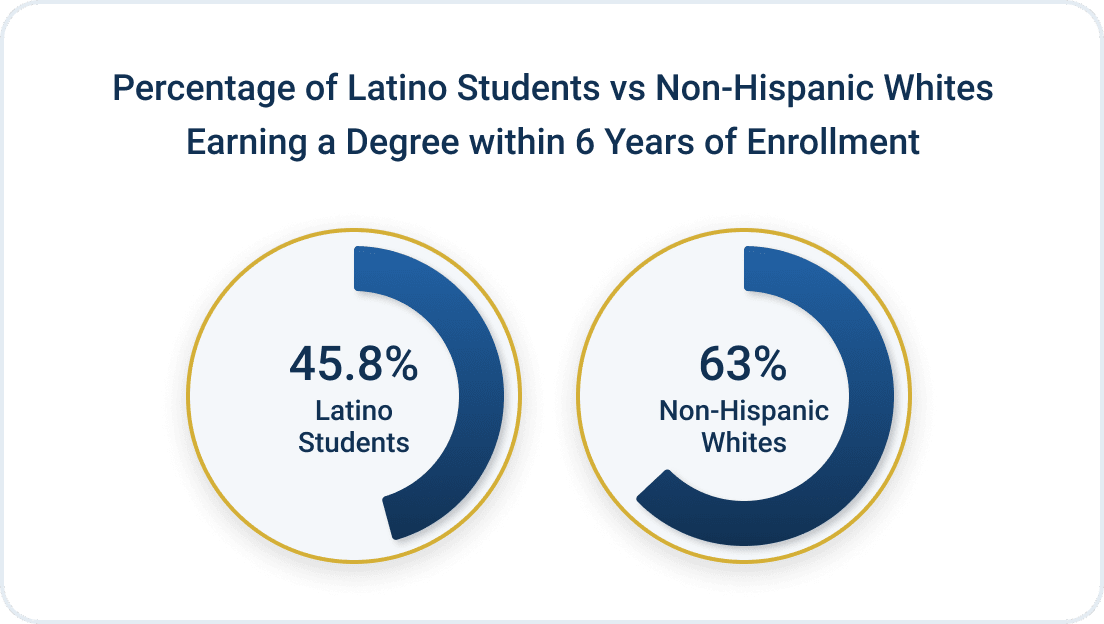College Guide for Latinx Students
Our nation is becoming increasingly diverse, and we are seeing that new level of diversity in the growing number of minority students in college populations. In 1997, data collected by the American Council on Education showed that only 11.1% of college students were Hispanic. Today that number is closer to 18%, and UnidosUS, a civil rights organization, projects it will be about 25% by 2026. In response to this growing demand, more and more colleges and universities are taking steps to become Hispanic Serving Institutions (HSIs).
However, while an increasing number of Latinx students are enrolling in college, a disproportionate number of them do not complete their degrees. According to a 2017 report from the National Student Clearinghouse Research Center (NSCRC), only 45.8% of Latinos earned a degree within six years of enrollment, as opposed to 63% of non-Hispanic whites.


This guide is designed to help Latinx students understand and navigate some of the more common challenges that may prevent them from earning their college degrees by highlighting resources that provide support. It also offers tips and advice for selecting the right college and applying for scholarships for Hispanics. Throughout, we'll offer expert insights from Sara Rivera, Assistant Director of the Latinx Student Cultural Center at Northeastern University.
Meet Our Experts

Sara Rivera
Assistant Director of Northeastern University's Latinx Student Cultural Center
Sara Rivera has been a staff member at Northeastern University's Latinx Student Cultural Center since 1997. As Assistant Director and Interim Director of the LSCC, she has worked to provide support, leadership development, and community to hundreds of students. In addition to supporting students through the LSCC, Sara is Chair of the LaCLA (La Comunidad Latina en Acción) Scholarship, Coordinator of the LaCLA Peer Tutoring Program, and adviser to all LaCLA scholars. She holds an AS in Business Administration, a BS in Leadership, and a Master's in Education, earning all as a non-traditional, first-generation student at the age of 28.
What are common barriers that Latinx college students face?
The relatively low retention and graduation rate among Latinx college students has prompted many in higher education to research and identify some of the more common, often interrelated barriers to completing a degree. A better understanding of these obstacles can help students avoid these problems or find solutions if they encounter issues.
Economic Standing
In 2020, UnidosUS, the largest advocacy and civil rights organization for Hispanics in the U.S., published an in-depth study of 78 Latinx college students and their families. One of their findings indicated that students in this demographic were more likely to come from disadvantaged backgrounds, even though Hispanics as a whole have one of the highest workforce participation rates. Some study participants stated that stress over the cost of a college education was a significant factor in their decision to pursue a degree.
Among those Latino college students who do not complete their degrees, 74% attribute that decision to the pressure to help support their families.
Sara Rivera of Northeastern University has witnessed this financial stress among Latinx students firsthand, and notes that it can be an emotionally tense issue. "If they were a source of income and now they're no longer that source of income, and they're not contributing to the family, there's a lot of guilt around that. Sometimes, they will leave and won't come back." Statistics from La Unidad Latina Foundation support Rivera's observation: Among those Latino college students who do not complete their degrees, 74% attribute that decision to the pressure to help support their families.
Feelings of Isolation and Homesickness
Several sources within the Latinx community suggest that many Hispanic students attending college for the first time feel there is no place for Latinos in higher education. Racism can be a factor in this feeling, and for some students, a language barrier can intensify these feelings of being excluded. Attending school virtually can also lead to a sense of isolation. For those students who go away to school, Rivera adds that it's not unusual for Latinx students, who often come from close-knit families, to miss their connections with parents, grandparents, and siblings, and they can feel extremely homesick toward the end of their first year in school.
To combat this problem, some schools have established Latino support centers on their campuses, and their services are generally available to both traditional and online students. Not only do these centers provide an onsite meeting place where students can make friends, they often provide resources that help enrollees get more involved and adapt to college life. Those students who think they might be especially susceptible to homesickness may also want to consider attending a college that's within easy traveling distance of home, as well as maintaining relationships by phone or internet.
Lack of Preparation for College
Many students start college unprepared for the new level of freedom and independence, and unaware of the extent to which they'll be responsible for their own education. Rivera says students are often surprised to discover that no one is monitoring their academic progress until they've fallen far behind and are put on academic probation. This is particularly true of students who attended high schools that lacked funding for resources. Students from disadvantaged backgrounds simply may not know that many colleges create programs to help students succeed because they have not had that experience in high school.
Rivera encourages students to learn to speak up and reach out for help when they need it. If students find themselves struggling with any aspect of their college experience, they need to know that schools typically offer a wide range of resources and solutions, from testing for hidden learning disabilities to tutoring to healthcare. "They need to learn how to advocate for themselves," notes Rivera, "or depending on the school they go to, they may have places like the Latinx Student Cultural Center that can help them or advocate for them."
Being A First-Generation Student
The UnidosUS study also found that 70% of Latinx students are the first in their families to enroll in college, which can be another obstacle for some. In addition to feeling financial pressures, first-gen students generally don't have any role models or mentors within their families who can help them navigate college. Every step—from applying to a school to filling out the FAFSA form to registering for classes—is new to the student and everyone else in the family.
For first-gen students, making the effort to reach out for information is essential. Information is available from many sources, from the internet to the public library to peers to the colleges themselves. "Everything can be available at your fingertips," advises Rivera, encouraging students to start their quest for information online. "It's just a matter of what keywords you're going to use to search, whether it's Latinx or first gen student."
She also recommends turning to both the admissions office and the financial aid office for help at all of the schools a student is considering attending. Students should be able to find contact information on each school's website, and they should feel free to call or email the school with all of the questions they have. Advisors are there to answer questions and offer guidance at every school.
Being an Undocumented Student
In some cases, Latinx students are also undocumented, which presents a unique set of hurdles, including challenges in filling out forms and paying higher tuition fees.
Undocumented students will find an abundance of useful information on our College Guide for Undocumented Students. Rivera also recommends two websites that some students may find useful: MyUndocumentedLife.org and InformedImmigrant.com.
Finding Resources and Support
At most colleges and universities, support and assistance for Hispanic and Latino students are available, but these resources are sometimes unfamiliar to students because they are not effectively publicized. Rivera recommends three useful steps to address this issue:
Find a mentor
Having someone within the educational system to turn to for advice is a powerful tool. A mentor may not have all the specific answers, but can steer a student in the right direction. Rivera says this can be an instructor, an advisor or counselor, an older student, or perhaps another staff member at the college. It's important to find someone who wants to serve that mentorship role and will enjoy checking in with their mentee routinely.
Hunt for campus resources
Sometimes schools set up resources for students, such as a Latinx cultural center, but then fail to adequately promote these resources, especially to graduate students who often receive a minimal orientation to their chosen school. Rivera encourages students to take on the responsibility of discovering these resources for themselves. "This is an investment in your future," she notes, "so it's really a matter of doing some research. Ask around. Ask your classmates who are in your same graduating class, your best friends, anybody. Do a search on the internet of a school's website. Look for student services or something similar, like activities or resources or clubs." Rivera says persistence is key in finding the help students need.
Build your own community
Support can come from peers as well, and Rivera points out that there are spaces on every campus related to almost any interest a student can have. Again, it requires searching for those spaces where students can meet others with similar interests and identities. The point of commonality could be Greek life, a specific area of study, such as music, engineering, or the arts, or it could be identity- or gender-based. "Whatever it is that you are interested in, that you feel is an avenue that you want to pursue as being part of your community, you can," says Rivera. "And here's the best part: You don't have to choose one, right? You can choose multiple because that's what intersectionality is. You can say, 'I'm a Latina who is queer, who is disabled, who's first gen,' and there are systems and communities in place for every single one of them. You have lots of different options, but it's just a matter of looking."
Networking becomes a little more challenging for online students, but it can still be done. You just have to be willing to make the first move. When interacting with peers on your class discussion boards, look for students with similar interests and goals. Connect online, and set aside time to nurture your relationships. You may be able to support each other during your college tenure and beyond.
Do students benefit from being involved in a Hispanic student organization?
Students who get involved in any campus activity enjoy a multitude of benefits. Rivera notes that at Northeastern, the Latinx Student Cultural Center attracts many students who identify as Latinx and many others who do not. The non-Latinx students often come to the center to practice speaking Spanish, but as a result of their participation, they usually end up making new friends, building on their network of peers, discovering resources they weren't aware of, and finding interesting volunteer opportunities. "That can be said about any space on campus that a student may go to, whether it's part of their identity or not," she adds. "In the end, you're opening yourself up to learning about something new. How can that be bad for you?"
How to Choose a College
For every student, choosing the right college is so much more than simply finding a traditional or online program that teaches the subject they're interested in at a cost that fits their budget. It's also about finding a school that's the right fit. Rivera explains, "As a student, you're investing in your future, and you want to feel as comfortable in this space as possible. You want to feel that this space is a space that you feel welcomed in and that you feel safe in and that you feel that they want you there."
To determine which schools are the right fit, students need to investigate as many schools as they can. If visiting a school in person isn't a realistic option, students should try to participate in virtual tours, which have become more common in recent years. During school visits, Rivera says, students should be prepared to ask many questions about the atmosphere of a school. Follow-up questions can also be directed to representatives in a school's admissions office.
To determine which schools are the right fit, students need to investigate as many schools as they can.
"Don't be afraid to ask tough questions," she advises. "What is the diversity, equity, and inclusion policy at your school? Do you have a Latinx center, and what percentage of the student body is Latinx? What is the sexual harassment policy at your school? What is the LGBTQ policy at your school? Do you have gender-inclusive bathrooms or gender-neutral bathrooms? Do you have a gender-inclusive dormitory? Whatever it is that is important to you in your identity or your educational growth, you need to ask about it at that institution. And if there's absolutely anything at all that you do not understand or that you disagree with, do not be afraid to push back and ask."
Latinx students may want to consider attending a Hispanic Serving Institution (HSI) either in person or online. To obtain this official designation from the U.S. Department of Education, HSI colleges and universities must show that at least 25% of full-time undergraduates are Hispanic, and they must actively serve this population. According to Excelencia in Education data, there are currently 569 HSIs concentrated across the Southwest and coastal states within the U.S. and Puerto Rico, and another 362 schools that have applied for HSI standing. Although the current number of HSIs represents only 18% of all higher educational institutions, they enroll 67% of Latinx students. Some of the HSIs that offer online degrees include New Mexico State University, Florida International University, West Texas A&M, and Concordia University-Chicago.
Hispanic Serving Institutions Nationwide

- Arizona: 22
- Arkansas: 1
- California: 175
- Colorado: 15
- Connecticut: 5
- Florida: 29
- Georgia: 1
- Idaho: 1
- Illinois: 29
- Indiana: 1
- Kansas: 4
- Louisiana: 1
- Maryland: 1
- Massachusetts: 9
- Nevada: 4
- New Jersey: 20
- New Mexico: 24
- New York: 35
- North Carolina: 1
- Ohio: 1
- Oklahoma: 2
- Oregon: 6
- Pennsylvania: 3
- Rhode Island: 1
- Texas: 94
- Utah: 1
- Washington: 6
- Washington DC: 1
- Wisconsin: 2
Investigating all of the many possible options—whether they're HSIs or not—requires a fair amount of time, so students should begin the process as early as possible. Rivera suggests getting help and working with parents, family members, and friends on conducting the research, but she also recommends making the decision alone.

"You don't want your decision to be influenced by anybody else. Your parents can guide you in a way, but it's not their experience, it's yours. Even if they're paying for it, it's unfair for your parents to try to guilt you into a particular choice. At the end of the day, it's really your decision."
Sara Rivera
Assistant Director of Northeastern University's Latinx Student Cultural Center
There are several other factors that may contribute to a student's ultimate choice between a two-year or four-year school and between an online or on-campus experience, but Rivera emphasizes that personal fit should be the primary factor. She says, "Don't get caught up on cost. Don't get caught up on community college, private, four-year, whatever. Don't get caught up on all of that. You just need to ensure you find whatever school is right for you. It may be a historically Black college or university. Who knows? You've got to feel that the school you choose is going to represent you and advocate for you."
Advice on Applying for Scholarships and Financial Aid
Financial aid is not limited to low-income students—all students are welcome to apply—and online and on-campus students are equally eligible for financial aid, as long as they're enrolled in an accredited college or university. Each year, hundreds of billions of dollars of financial aid are awarded to college enrollees across the U.S. In the 2019-2020 school year alone, financial aid dollars totaled $242 billion.
The Free Application for Federal Financial Aid (FAFSA) is the form students use to apply for all types of federal financial aid, such as Pell grants, and for most types of state- and school-sponsored aid. Filling out the application is admittedly a time-consuming process, but the prospect of receiving financial aid—especially grants and scholarships that students never need to pay back—is well worth the investment of time and effort. Rivera says she's surprised at the number of students who don't fill out the FAFSA because they assume they won't qualify. "It's free to fill out, and you might get some funding," she notes. Students who need assistance filling out the FAFSA application can request help from their high school or college financial aid counselors, and can find additional information on the FAFSA website.
Filling out the application is admittedly a time-consuming process, but the prospect of receiving financial aid—especially grants and scholarships that students never need to pay back—is well worth the investment of time and effort.
For high school students who are considering going to college but know they will need some financial assistance, it's never too early to start positioning for scholarships. Awards are often based on need and merit, so scholarship sponsors look for applicants who are serious about their education, as demonstrated by earning relatively good grades, and who have been actively involved in their schools and communities.
Scholarships for Latinx Students
Scholarships are undoubtedly the most desirable form of financial aid for all students. Because they don't have to be repaid, they minimize the amount of student loan debt—and the stress that comes with it—that students may need to take on. Scholarships can also open doors by expanding the number of colleges students can select from, and they provide an impressive boost to any graduate's resume. Latinx students may be particularly interested in the lists of scholarships below, all of which are expressly designated for Hispanic and Latino students. Applying for scholarships—which are not covered under the FAFSA form—costs nothing, other than time, and the effort is well worth the rewards.
General Scholarships for Hispanic/Latino Students
Latino Community Credit Union (LLCU) Scholarship
Since founding its scholarship program in 2016, the Cooperativa Latino Credit Union has awarded more than $350,000 to members to help meet their college education goals.
Award Information
- $2,500 awards
- Number of annual awards varies
Eligibility
Applicants Must
- Be a member of the LLCU
- Be attending or planning to enroll in a bachelor's or associate degree program
- Have a minimum GPA of 2.5
Application Information
- Spring deadline
- Required documentation includes an essay, letters of recommendation, and a copy of the school's acceptance letter
- Greater consideration is given to applicants and/or their families who use LLCU as their primary bank
In addition to providing more than $30 million in scholarship funding each year, the Hispanic Scholarship Fund provides recipients with services such as job search support, mentors, leadership development opportunities, and wellness training.
Award Information
- $500-$5,000 awards
- 10,000 awards given out annually
Eligibility
Applicants Must
- Be of Hispanic heritage
- Be a U.S. citizen, permanent legal resident, or DACA
- Have a minimum 3.0 GPA for high school students; minimum of 2.5 GPA for undergraduate and graduate students
- Be planning to enroll full-time in an accredited, public or not-for-profit, four-year university or graduate school
Application Information
- Winter deadline
- Applicants should submit the FAFSA before applying for this scholarship
LULAC National Scholarship Fund (LNSF)
The League of United Latin American Citizens created this scholarship fund to help aspiring college students in underserved communities. Funding comes from a combination of grassroots organizations and corporate sponsors.
Award Information
- Three types of awards available:
- National Scholastic Achievement Awards of $2,000
- Honors Awards of $500-$2,000
- General Awards of $250-$1,000
- Number of annual awards varies
Eligibility
Applicants Must
- Be a U.S. citizen, legal permanent resident, or DACA
- Have a minimum GPA of 3.0-3.5 depending on the type of award
- If an undergraduate student, have applied to or be enrolled as a full-time student in a two- or four-year college or university
- If a graduate student, have applied to or be enrolled as a part-time student in a college or university
Application Information
- Required documentation includes a 500-word essay, high school or college transcripts, and a copy of the school's acceptance letter
NBCUniversal/LNESC Scholarship
This merit-based scholarship is aimed at undergraduate students. Recipients must be able to demonstrate an interest in media, but they are not required to major in a related field.
Award Information
- $5,000
- 10 awards given annually, divided into two equal disbursements
Eligibility
Applicants Must
- Be a college sophomore or junior enrolled full-time in an accredited college or university
- Have a minimum GPA of 3.0
- Be a U.S. citizen or legal permanent resident
- Have an interest in the media and entertainment industry
Application Information
- Summer deadline
- Required documentation includes college transcripts, three letters of recommendation, and a resume
La Unidad Latina Foundation Scholarship
Founded in 1999, the La Unidad Latina Foundation supports Latinx students in earning a college education through scholarship funding and other support programs.
Award Information
- Up to $2,000
Eligibility
Applicants Must
- Be of Hispanic or Latino descent (any gender)
- Be currently enrolled in a bachelor's, master's, or doctoral program
- Have a minimum 2.8 GPA
- Demonstrate financial need
Application Information
- Fall deadline
- Required documentation includes college transcripts, a letter of recommendation outlining civic activities, and a copy of college acceptance letter
McDonald's HACER National Scholarship
McDonald's provides funding for Latinx high school students through the HACER program, which stands for Hispanic American Commitment to Education Resources.
Award Information
- $25,000
- 130 annual awards
Eligibility
Applicants Must
- Be a high school senior with a minimum 2.8 GPA
- Be a legal U.S. resident
- Be enrolled in an accredited institution one year after selection
- Be of Hispanic heritage
Application Information
- Required documentation includes an essay, high school transcripts, a list of community service projects, and the student report generated from the FAFSA application
- An interview is part of the application process
Make the U” Colgate-Palmolive Scholarship
Colgate-Palmolive has partnered with the Hispanic Heritage Foundation to support Hispanic students in their pursuit of college education. Scholarships are awarded to students who demonstrate academic excellence, community service, and leadership abilities.
Award Information
- $1,000
- 100 annual awards
Eligibility
Applicants Must
- Be of Hispanic or Latino descent
- Be a high school senior planning to enroll in college
- Have a minimum 3.0 GPA
- Be a U.S. citizen, legal permanent resident, or DACA eligible
Application Information
- Winter deadline
Alliance of Hispanic Serving Institution Educators
The Alliance of Hispanic Serving Institution Educators (AHSIE) supports educators and practitioners employed at Hispanic Serving Institutions (HSIs) through engagement and collaborative learning. Members extend that mission by providing scholarship funding for Latinx students attending HSIs.
Award Information
- Multiple scholarship awards available
- Amounts vary
Eligibility
Applicants Must
- Be a first-generation college student
- Be an undergraduate or graduate student enrolled at a Hispanic Serving Institution (HSI) in the U.S. or Puerto Rico
- Participate in HSI-related paid or volunteer work, such as research or advocacy
- Have a minimum 3.0 GPA
- Be a U.S. citizen, legal permanent resident, or DACA eligible
Application Information
- Winter deadline
- Application form requires three short essays
Specialty Scholarships for Hispanic/Latino Students
ExxonMobil Engineering Scholarship
ExxonMobil seeks to encourage Latinx students in high academic standing to focus on engineering. Local scholarships are reserved for students residing in 15 specific U.S. cities, but the national award is available to all students across the country.
Award Information
- One $20,000 national award
- 12 $2,000 local scholarships for qualified high school seniors given annually
Eligibility
Applicants Must
- Be a graduating high school senior
- Be of Hispanic heritage
- Have been accepted into and planning to attend a full-time bachelor’s program in engineering at an accredited college or university in the U.S.
- Have been accepted into and planning to attend a full-time bachelor’s program in engineering at an accredited college or university in the U.S.
- Have a minimum GPA of 3.5
- Have scored 29 or higher on the ACT test, or 1350 or higher on the SAT test
- Be a U.S. citizen or have the legal right to work in the U.S without sponsorship
- For local scholarships, must reside in one of 15 select cities (see scholarship website for complete list)
United Health Foundation Diverse Scholars Initiative
Sponsored by the National Association of Hispanic Nurses (NAHN), the Scholars Initiative provides funding for nursing students at all levels, from associate to graduate programs.
Award Information
- $5,000 per year for up to three years
Eligibility
Applicants Must
- Be a NAHN member
- Be attending or enrolled in an accredited full-time nursing program
- Show a demonstrated financial need
Application Information
- Spring deadline
The Hispanic Health Professional Student Scholarship
Since 2004, the National Hispanic Health Foundation has awarded more than $1.5 million to graduate students in health and medical fields. BSN students are also eligible for this scholarship.
Eligibility
Applicants Must
- Be enrolled full time in an accredited graduate program in medicine, dentistry, pharmacy, nursing, public health and policy, or physician assistant OR a bachelor's of nursing (BSN) program
- Be a U.S. citizen, resident, or DACA
- Have a minimum of 3.0 GPA
- Demonstrate an interest in the health of Hispanic communities and NHHF events
Application Information
- Fall deadline
- Required documentation includes unofficial transcripts, a letter of recommendation, an essay, and a resume
National Association of Hispanic Journalists (NAHJ) Scholarships
The National Association of Hispanic Journalists supports journalism students at all levels. Over the past 30 years, the group has awarded more than $1.7 million to nearly 800 students.
Award Information
- $1,500-$10,000
- Eight different scholarships available
Eligibility
Applicants Must
- Be a high school senior, college undergraduate, or graduate student pursuing careers in English or Spanish-language print, broadcast, digital, or photojournalism
- Students must have a minimum 3.0 GPA
Application Information
- Winter deadline
- Required documentation includes an essay, letters of recommendation, high school transcripts, a resume, W-2 forms, and a financial needs statement
- Some NAHJ scholarships may require work samples
Silicon Valley Community Foundation Latinos in Technology Scholarship
This need- and merit-based scholarship fund is designed to encourage Northern California-residing Hispanic students to enroll in STEM programs.
Award Information
- Up to $30,000
- 100 annual award
Eligibility
Applicants Must
- Be of Latino or Hispanic origin
- Have been accepted into a STEM undergraduate program
- Be a graduate of a high school in one of 11 Northern California counties, or enrolled in a college or university in one of those counties (see scholarship website for complete list)
- Have a minimum cumulative college grade point average of 3.0
- Demonstrate financial need
- Be a United States citizen or eligible non-citizen (legal residents or DACA)
Application Information
- Required documentation includes an essay, letters of recommendation, high school transcripts, and a copy of the Student Aid Report (SAR) OR California Dream Act Application
Prospanica Foundation Scholarship
The Prospanica Foundation advocates for Hispanic business professionals. The organization encourages undergraduate and graduate students to study business.
Award Information
- $2,000-$5,000
Eligibility
Applicants Must
- Be a U.S. citizen, legal permanent resident, or DACA recipient
- Be of Hispanic/Latino heritage
- Have a minimum GPA 3.0 (or equivalent) OR minimum 2.75 GPA in combination with work experience during that time
- Be a Prospanica Foundation member
- Be enrolled or planning to enroll in a postgraduate or undergraduate business program at an accredited university in the United States or Puerto Rico
- Have at least sophomore year standing
Application Information
- Spring deadline
- Required documentation includes an essay, letters of recommendation, and high school transcripts
- Additional documentation may be requested for second-round applicants
The UNIVISION NATAS (National Academy of Television Arts & Sciences) Scholarship
The National Academy of Television Arts & Sciences is dedicated to the advancement of television and electronic media. Through the Univision scholarship fund, the organization promotes an interest in television and communications media among Latinx students.
Award Information
- $10,000
Eligibility
Applicants Must
- Be of Hispanic or Latino heritage
- Be a high school senior interested in pursuing a career in the television industry
Application Information
- Spring deadline
- Required documentation includes an essay, letters of recommendation, and high school transcripts
Society of Hispanic Professional Engineers (SHPE) Scholarships
The Society of Hispanic Professional Engineers supports Latino students majoring in STEM subjects by providing more than $600,000 in scholarship funding annually.
Award Information
- Multiple scholarship awards available
- Amounts vary
Eligibility
Applicants Must
- Be a SHPE member
- Have a minimum 2.75 GPA
- Plan to pursue a STEM degree
- Be attending an academic institution in the United States or Puerto Rico
Application Information
- Spring deadline
Alice Newell Joslyn Medical Scholarship
Sponsored by the BECA Foundation, the Alice Newell Joslyn Scholarship provides funding for San Diego County Latinx students who wish to pursue any level of medical degree.
Award Information
- $500-$2,000
Eligibility
Applicants Must
- Be a recent high school graduate in San Diego County (California)
- Be an undergraduate, graduate, or doctoral student in medical/dental assistant, nursing, physical therapy, or similar health field
Application Information
- Spring deadline
- Required documentation includes an essay, two letters of recommendation, high school transcripts, and the student report generated from the FAFSA application
Latin American Educational Foundation (LAEF) Scholarship
For more than 70 years, the Latin American Educational Foundation has been supporting Hispanic and Latinx students in Colorado in their pursuit of higher education. To date, the organization has given out more than $7 million in scholarships.
Award Information
- Number of awards and amounts vary
Eligibility
Applicants Must
- Be a Colorado resident (regardless of legal residency status or citizenship)
- Be of Hispanic/Latino heritage and/or actively involved in the Hispanic/Latino Community
- Have a minimum high school or college GPA of 3.0
Application Information
- Winter deadline
- Required documentation includes unofficial transcripts, two letters of recommendation, an essay, current photo, list of extracurricular activities, financial documents, and the student report generated from the FAFSA application
The BECA Foundation provides funding and mentoring for Hispanic students in San Diego County. Since 1984, BECA has disbursed more than $1.8 million in awards.
Award Information
- $500-$1,000
Eligibility
Applicants Must
- Be a recent high school graduate in San Diego County (California) entering college or university
Application Information
- Spring deadline
- Required documentation includes an essay, two letters of recommendation, high school transcripts, and the student report generated from the FAFSA application
Jose Marti Scholarship Challenge Grant Fund
Dedicated to supporting Hispanic students attending Florida colleges and universities, the Jose Marti Scholarship is based on both need and merit.
Award Information
- $2,000
Eligibility
Applicants Must
- Be a Florida resident (regardless of legal residency status or citizenship), enrolled full time in a Florida-based college or university
- Be of Hispanic/Latino heritage
- Have a minimum 3.0 GPA
- Demonstrate financial need
Application Information
- Spring deadline
- Applicants must first submit the FAFSA
Additional Resources
There are many non-profit organizations that exist to support minority groups as a whole, and some that provide assistance to Latinx college students and others involved in higher education specifically. Students might want to explore the following organizations:
- Excelencia in Education: The Excelencia advocacy group operates a number of programs and networking opportunities for Latinx college students. Membership in the organization also gives students access to informative research and other resources.
- Hispanic Association of Colleges and Universities (HACU): Although HACU is directed toward educators employed at or associated with Hispanic-oriented institutions of higher education, the website provides valuable information for Hispanic students.
- Hispanic Heritage Foundation: Founded in 1987, the Hispanic Heritage Foundation (HHF) celebrates the cultural pride of the Latino community. To fulfill its mission of assisting Latinos in helping other Latinos, the HHF operates a number of programs that prepare individuals for leadership positions in education, business, and communities of all types and sizes. This includes a Latino student fund that finances an array of college scholarships.
- Hispanic Scholarship Fund: The Hispanic Scholarship Fund (HSF) is more than a source for scholarships. Students who are selected for the HSF scholars program gain access to support services that help them navigate the college experience. Services include mentoring, wellness training, and job placement assistance.
- League of United Latin American Citizens: The League of United Latin American Citizens (LULAC) is the oldest and largest Hispanic organization in the U.S. Boasting more than 130,000 members, LULAC acts as an advocacy group for the economic condition, educational goals, political influence, and civil rights of all Hispanic Americans. College scholarships are just one of the organization's many community-based programs designed to support the Latinx community.
Related Articles
College Guide for Indigenous and Native American Students
Our guide will help Native American students choose a college, find scholarships, and navigate the most common barriers in higher education.
By OnlineU Staff Writers | 10/5/2022

Fortunately, a growing number of non-profit organizations are working to increase the amount of private funding available for Latinx students, and are making efforts to build awareness of these and other available resources. Although financial aid cannot provide economic support for students' families, it can at least help ease the burden of paying for college.